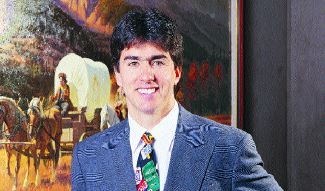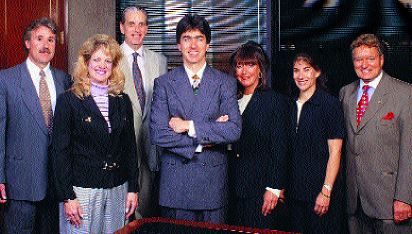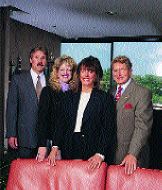

Harry W. Rhulen, chairman, chief executive officer

Joining Harry Rhulen (center) are other executives of Frontier. From left: Jonathan Farrow, senior vice president, underwriting administration; Donna Braunstein, CPCU, second vice president, new business development division; Peter Foley, executive vice president; Jill Gold, executive vice president; Suzanne Rhulen Loughlin, executive vice president, chief administrative officer; and Tom Dietz, CPCU, president, Frontier Healthcare.
With a name like Frontier, you're bound to get a reputation as a pioneer--and that's exactly how the Frontier Insurance Group sees itself in the challenging market of specialty program coverages. Established in 1977 to provide markets for The Rhulen Agency, a well-known specialty lines brokerage dating back to the 1930s, Frontier has since broadened its scope and now offers a wide variety of specialty programs through both managing general agents and retail agents nationwide. In the process, Frontier has become known for its can-do attitude and its staunch loyalty to the agents who sell its products.
In this article we'll meet some key players at Frontier and find out how this widely diversified but extremely focused organization has achieved notable success writing risks that are usually viewed as unattractive by the rest of the insurance marketplace. First we'll learn something about the structure and operations of the Frontier Insurance Group, which is located in Rock Hill, New York, and which through several subsidiaries, operates on both an admitted and a nonadmitted basis in all 50 states.
Frontier Insurance Group is the holding company for Frontier Insurance Company, which is licensed as an admitted property and casualty carrier in all 50 states, DC, Puerto Rico, and the Virgin Islands. Frontier Insurance Company and its subsidiaries write a wide range of bonds, including surety, license and permit, and bail bonds; medical and dental malpractice; health and human services; larger commercial liability and environmental liability; nonstandard errors and omissions and directors and officers liability; financial and specialty niche programs; life, health, and other auto aftermarket insurance products; and specialty personal lines. Frontier also owns a claim adjustment and claim management company and a premium finance company.
Frontier is organized into six specialty divisions: Alternative Risk, Environmental Specialties, Financial Markets, Health Care, Specialty Program and Surety. Shortly we'll meet the executives who have responsibility for Frontier HealthCare and the Specialty Program Division, both of which write a substantial amount of business through retail independent agents. For an overview of Frontier's operations, we'll talk with Harry W. Rhulen, chairman, chief executive officer, and president of Frontier Insurance Group.
A family affair
The Rhulen Agency was established in 1934 by Max Rhulen. Max's son, the late Walter A. Rhulen, founded Frontier in 1977, and Walter's son, Harry Rhulen, assumed leadership of Frontier on his father's death earlier this year. It's a position Harry was well prepared to take on. Given his family background, it's no surprise that he prepared himself for an insurance career. For him, there really wasn't any thought of pursuing a career in another field:
"I always intended to go into insurance," he says. He received an undergraduate degree from The College of Insurance. He then earned a law degree and an MBA at Syracuse University, and in 1989 he joined The Rhulen Agency as a claims attorney. Later that year the agency was sold to Markel Corporation of Richmond, Virginia, and Rhulen--along with many other agency employees--moved to Frontier. Harry became chief operating officer in May of 1997 and assumed his present position in January of this year.
An appetite for tough risks
The Rhulen Agency was long known for its specialty programs for children's summer camps and various other outdoor recreation risks. Today Frontier continues to offer those programs, plus a host of others, virtually all on hard-to-place exposures that standard markets don't want to entertain. Frontier's corporate philosophy makes clear where the insurer sees itself in the marketplace:
"Frontier Insurance Group, Inc., is an underwriter and creator of specialty insurance products which serve the needs of insureds in marketplaces that have few competitors, are generally considered unattractive and offer an unusual opportunity for profit. Through quick decisions, agile positioning, and the creation of value added, we provide the ingredients that are essential to profitable niche marketing."
Frontier, Rhulen explains, writes mostly program business--and he's quick to credit retail agents with being a big part of the organization's marketing effort. "Our entrepreneurial spirit and initiative come from agents," he asserts. In fact, he adds, "Most programs are brought to us by agents who want to expand their markets and need a business partner. In turn, we offer them our expertise and our distribution facilities. In addition to writing both admitted and excess-surplus business in all 50 states, we also have the ability to establish captives and rent-a-captives." Unlike many carriers, he points out, "We'll write programs for $1 million or even less--no $5 million or $10 million minimums."
Of Frontier's programs, Rhulen notes, "Many are available on an open brokerage basis to retail agents; an equal number are handled by program administrators through retailers. The majority of our business is produced by retail independent agents."
"Agents are our customers"
At Frontier, Rhulen emphasizes, "Our customers are our agents. And the primary thing that ultimately differentiates us from other carriers is our customer service. With an agency background, we know what it's like to be a retailer, and we respect that. We view our relationships with retailers as paramount. We're successful in bringing in new business and retaining it, and the key is the services we provide our agents. Our focus is on the agent."
Frontier also acquires existing business from agencies where the owner wants to retire or simply stop writing certain classes. "Some larger agencies have built big plants but don't have an exit strategy," Rhulen explains. "We'll make a deal to acquire an entire agency or just specific programs. That's another way we help agents and maintain good markets."
 "There are certain exposures other companies fear. . . We create programs specifically for these types of insureds and underwrite around the exposures."
"There are certain exposures other companies fear. . . We create programs specifically for these types of insureds and underwrite around the exposures."
--Jonathan Farrow
Specialty Program Division
Among Frontier's six specialty divisions, the Specialty Program Division is one that markets a substantial amount of business through independent retail agents. To learn more about this sector, we'll talk with Jonathan Farrow, senior vice president of the division, and Jane Gordon, second vice president and manager of the division's largest underwriting unit. Farrow, who is a cousin of Harry Rhulen and a grandson of Max Rhulen, also knew early that he would pursue an insurance career. Like his cousin, he joined The Rhulen Agency after graduating from college, and was involved primarily in sales and marketing.
When Markel Corporation acquired Rhulen in 1989, Farrow moved to Markel, where his career shifted to underwriting. When Markel moved to Virginia in 1992, Farrow was hired as vice president of marketing at Frontier. The next year he became acting vice president of underwriting, a position he continues to hold. He is now senior vice president of the Specialty Program Division and also handles the company's several compliance departments.
Gordon, who has a background as a teacher and day care provider, joined Rhulen in 1983, having learned about the agency because many of its employees brought their children to her day care center. Using her experience in working with youngsters, she became involved in brokerage sales in the camp and youth recreation areas that were the agency's original specialties. When Markel acquired Rhulen, Gordon became an underwriting manager overseeing a growing book of business. When Markel moved to Virginia, she joined Frontier as assistant vice president with responsibility for its child care program as well as other programs.
A "mixed bag" of programs
What kinds of business are handled in the Specialty Program Division? "Ours is a unique division," Farrow says. "In most of Frontier's other divisions, like Alternative Risk, Surety, and HealthCare, the insureds and risks are homogeneous. In our division, the programs are a mixed bag--title agents E&O, crane/rigging contractors, outdoor recreation, pest control operations and demolition contractors. Our strongest programs are pest control, California artisan contractors, outdoor recreation, and children's camps," he notes. "These may not be our largest programs, but they're the best in terms of bottom-line profitability."
The Specialty Program Division has four underwriting units that manage a total of 50 programs, and each unit has a manager who is responsible for overseeing its programs. The division's state filings and underwriting support operations also report to Farrow. "State filings are very important when underwriting business on an admitted basis that used to be nonadmitted," Farrow explains. "To provide good products, we must be able to file various manuscript forms and rates."
Also of key importance, Farrow points out, is compliance with regulatory authorities. "Our division has a compliance unit, and we also have an agent licensing and appointments unit that conducts background checks on agents during the initial appointment process. It is imperative to ensure that an agent is financially stable before entering into a partnership that gives the agent considerable authority to act on behalf of Frontier."
Smaller can be better
Farrow echoes Rhulen's assertion that programs don't have to be big to be profitable. "We can have a $1 million program with a loss ratio of 30% and do better than we would on a $7 million program with an 80% loss ratio," he points out. "We're not always after the big guys; we have many smaller insureds, and that's a key factor in our comfort level with respect to the competition."
Declining to compete for main-line risks and large insureds is a calculated part of Frontier's marketing strategy--and one that's standing it in good stead in a soft market that many industry veterans believe may be here to stay. "We're in a very soft market," Farrow observes, "and maybe that's how things will always be. There's a lot of capacity, a lot of carriers looking for niches. Competition exists, but it's less severe for insureds with annual premiums under $25,000. There are certain exposures other companies fear: contractors continuous trigger, environmental pollution, athletic injury liability. We create programs specifically for these types of insureds and underwrite around the exposures."
Adds Jane Gordon: "On outdoor recreation business, like outdoor guides and whitewater rafting, we always have the same competitors. They always look at the big risks, and we do well by going for the smaller insureds."
Fast turnaround
In terms of markets, Gordon notes, "We can offer both admitted and nonadmitted facilities. We're probably one of the faster companies in getting a program up and running once we've decided it's good." She offers an example: "In December of 1997 we decided to get back into the business of insuring camps." (This successful specialty of The Rhulen Agency was dropped when the agency was sold in 1989.) In less than six months we have filed our program in all 50 states. This could have taken other carriers two years to put together." What's more, she says, "We're all extremely reachable. We offer co-op advertising and help create marketing materials, and we split the cost of ad placements with the agent. Also, our loss control specialist works with both underwriters and agents to reduce loss frequency, which in the long run produces more profitable business."
A key to Frontier's success, and its strong relationships with agents, Farrow explains, is: "Frontier employees are all empowered to take action and make decisions, and are accountable for those actions and decisions. We don't have multiple layers of authority, so we can respond quickly. That's very important to agents, especially in an industry like ours that's so bogged down in paperwork."
Agents as partners
As Harry Rhulen pointed out earlier, Frontier places a high value on its relationships with retail agents, treating them as both customers and partners. "There's a strong loyalty between Frontier and its retail agents," Farrow asserts; "it's a true partnership arrangement. It's agents' relationships with insureds and our relationships with agents that keep Frontier growing."
Says Gordon, "We try to align ourselves with agents who know as much as or more than we do about specific programs. In some cases, a single program accounts for as much as 50% of an agency's total volume." Farrow agrees: "We recognize our agents as experts in their product lines and appreciate their expertise."
In addition to product knowledge, what other factors does the Specialty Program Division consider when deciding whether to do business with a particular retail independent agent? Of key importance, Farrow says, "We want to align ourselves with someone who has an insurance company mentality, who's capable of looking at the long term as opposed to the short term. An agent may have a book of business that's one or two years old and has a 20% loss ratio. He or she needs to understand that that isn't enough to know the true picture--we may not know the ultimate loss ratio for six years. The agent needs to understand the significance of the long tail on liability business."
On a more personal level, Gordon declares, "We want to align ourselves with someone with whom we can have a long-term partnership. We give and expect loyalty." Adds Farrow: "Chemistry is important--we look at that before analyzing a program. It's important to be able to work well together."
Frontier HealthCare
Another veteran of The Rhulen Agency who's now a vice president of Frontier Insurance Group is Jill Gold, who with two other executives manages Frontier HealthCare. FHC is a newly formed division that provides a wide range of programs to cover the liability risks of the health care and social services industries, including medical and dental malpractice, and programs for both nonprofit and for-profit entities.
Gold joined The Rhulen Agency in 1973 and handled program business as a managing general agent. After Markel Corporation acquired Rhulen in 1989, she stayed with Markel for three years, running a Frontier-underwritten program for health and human services risks. In 1992, when Markel moved to Virginia, Frontier bought back the program and Gold went to Frontier.
A large percentage of Frontier HealthCare's premium, Gold says, is in medical malpractice, where the focus is on the admitted marketplace, where demand for the coverage is stronger. "On the health and human services side, we insure entities of all kinds that have a health-related component: mental health facilities, drug and alcohol rehabilitation centers, physical rehab facilities, children's homes, day care centers, community health centers, and home health operations," she says. "We offer all lines of coverage: auto, property, casualty, directors and officers liability and umbrella."
The soft market, Gold observes, has created competition in all of her division's specialties. "We have the edge over the current entrants, because we've been handling this kind of business all along," she comments.
"Agents are our focus"
Like Harry Rhulen, Jonathan Farrow and Jane Gordon, Jill Gold holds Frontier's retail agents in high regard. "Our division relies on our loyal retail agents; we value them highly and view them as partners," she says. "We particularly value their input with regard to product enhancements and market conditions. To prove it, we mandate a certain level of service for our agents; we have measurable standards for turnaround of quotes, policies, endorsements, and claims. We try to foster strong relationships with retail agents; they are our principal focus."
Putting it all together
In one of the most challenging insurance markets the property/casualty business has seen in decades, the Frontier Insurance Group clearly is positioning itself for success--by identifying niche markets where other carriers fear to tread, by creating and offering programs with a strong profit potential and by building and nurturing loyal, long-term relationships with carefully selected retail independent agents.
As Harry Rhulen puts it: "We're an agent-friendly company. We view our agents as our primary business partners, and we want to help them develop their business." *
©COPYRIGHT: The Rough Notes Magazine, 1998